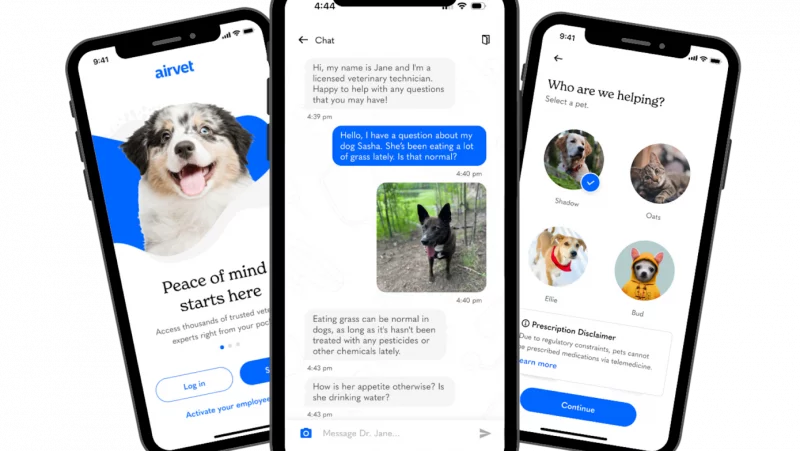Airvet, a leading pet telehealth company, has successfully secured $18.2 million in a recent Series B funding round, marking a significant step towards its enterprise-focused mission. The surge in pet ownership during the global pandemic has resulted in a soaring demand for veterinary services, and unfortunately, veterinarians are struggling to keep up.
A comprehensive report by Mars Veterinary Health in 2022 revealed an urgent need for more than 41,000 veterinarians to join the industry within the next decade in order to meet the growing demand adequately. Unfortunately, the number of people pursuing careers in veterinary medicine is insufficient, leading to an estimated shortage of 15,000 veterinarians by the year 2030.
Recognizing the critical situation, Airvet aims to alleviate this scarcity by offering innovative telehealth solutions. Founded in 2018 by CEO Brandon Werber, whose father, Dr. Jeff Werber, is a renowned veterinarian, the company’s mission is to connect pet parents with practicing veterinarians for telehealth visits on any day and at any time.
Brandon Werber emphasized the urgency of the vet shortage issue, stating that it could lead to exorbitant costs and significant difficulties in obtaining care for pets when they fall sick. Many veterinarians are already unable to take on new clients and are advising pet owners to seek alternatives such as urgent care or emergency rooms. However, these impromptu visits can be financially burdensome for most people, making accessible and affordable pet care a pressing concern.
With the recent injection of $18.2 million in funding, Airvet is well-equipped to expand its services and bridge the gap between pet owners and veterinarians. The company’s dedication to leveraging technology to enhance pet healthcare offers a glimmer of hope in addressing the impending veterinarian shortage and ensuring that our beloved animal companions receive the care they deserve.
Help is on the way
The pet care industry in the U.S. is set to experience substantial growth, projected to rise from $118 billion in 2019 to a staggering $277 billion by 2030. With such an evident demand, there lies a great opportunity for technology to lend a helping hand.
Startups and venture capitalists have taken note of this potential goldmine and are eager to be a part of it. Among the prominent players are companies like Digitail, Mixlab, The Vets, and Dutch, each offering innovative solutions to support veterinarians and enhance pet care. Even newer startups are entering the scene, like Mascotte Health, a UAE-based veterinary service provider, which recently secured an impressive $1.2 million in pre-seed funding. Another notable example is Maven Pet, which successfully raised $3 million to employ AI in detecting early signs of serious illnesses in dogs and cats, an initiative led by their co-founder and CEO, Guilherme Coelho.
Nevertheless, not every company has thrived under the increasing demand for veterinarian services. Take Fuzzy, for instance, a company that introduced a digital pet care network of veterinary professionals and had previously attracted $80 million in venture-backed funding since its establishment in 2016. Despite its initial success, reports suggest that Fuzzy had to shut down in June, highlighting the challenges some businesses have faced in this rapidly evolving market.
The enterprise route
After witnessing the challenges faced by Fuzzy and navigating through market shifts, Werber gained valuable insights. It became evident that building a company hastily and without a clear vision is unsustainable. To thrive, one must focus on profitability, healthy margins, sound unit economics, and the creation of a truly scalable business. This realization prompted us to reevaluate our business model and strategy.
Within the pet tech industry, various approaches have been adopted, with many concentrating on direct-to-consumer healthcare or facilitating veterinarians in managing their practices. However, Airvet saw an opening in the business-to-business realm. Consequently, the company has successfully established partnerships with employers such as Adobe, Ceridian, and Rexford Industrial, who are keen on offering employee benefits related to pet care.
Although specific details regarding customer and revenue growth remain undisclosed, Werber envisions Airvet surpassing 50 customers within the coming year, with revenues showing accelerated growth.
To further strengthen its position, Airvet secured funding in a Series B round, led by Mountain Group Partners, with participation from Canvas Ventures, Headline, Burst Capital, and strategic investors, including VCA Animal Hospitals founder, Bob Antin. This investment brought Airvet’s total funding to just over $33 million, and as part of the deal, Byron Smith from Mountain Group Partners joined the company’s board.
The newly acquired funding will be directed towards expanding Airvet’s partnerships with enterprise and employer clients, bolstering product development, and scaling up the company’s sales and marketing teams.
“Our primary goal now is to establish this category as a widespread offering for all employers and enterprises, providing acknowledgment, support, and resources for pet families struggling in various aspects,” Werber explained. “Accessibility and affordability of pet care are crucial factors in achieving this objective.”

